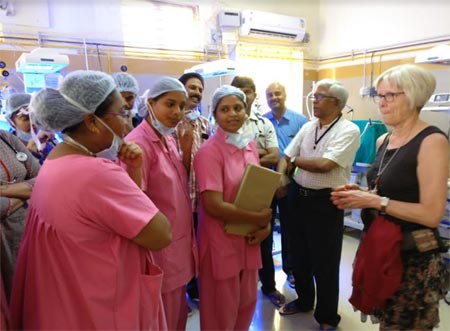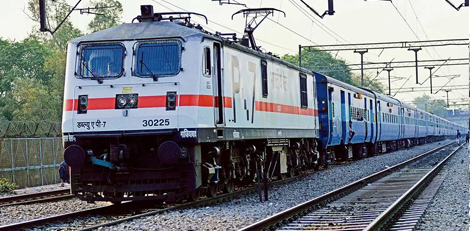ACCESS Health International and Safe Care
Posted on: 29/Nov/2017 5:22:07 PM

World renowned lactation expert and professor in pediatrics and nursing, Paula Meier PhD, visited Newborn Intensive Care Units (NICUs) across Telangana to help nurses and staff to implement a process of quality improvement to help them overcome the barriers to feeding NICU newborns mother�s milk. Dr. Meier heads the RUSH human milk research team in Chicago, USA that conducts translational studies that address barriers to high dose, long exposure mothers own milk (MOM) feeding for NICU infants. During her visit, Dr. Meier spoke with nearly 500 faculty and staff from hospitals that are implementing quality improvement initiatives through the Safe Care, Saving Lives program.She shared evidence from her studies showing that providing mothers own milk to babies in NICUs coast less than $1,000 US, a fraction of the cost of treating many of the diseases that mothers milk helps protect against, such as sepsis.
Dr. Meier spoke with faculty and staff in NICUs across Telangana about how a process of quality improvement could help them identify and address barriers to breastfeeding. Through its Safe Care, Saving Lives program, ACCESS Health teaches hospitals how to use quality improvement methodology to identify opportunities to increase newborn survival rates � such as early and exclusive breastfeeding � and implement changes in their NICUs to make sure those opportunities are not lost.
Dr. Meier visited three hospitals and spoke to their faculty and staff: Niloufer Hospital, Government Modern Maternity Hospital-Petlaburz, Mahatma Gandhi Memorial Hospital Warangal. Faculty and staff from other hospitals were also invited to participate in the academic learning sessions organized during at the three hospitals. Faculty and staff from the Government Maternity Hospital-Hanamkonda, CKM Maternity Hospital, Gandhi Hospital, Government Maternity Hospital, Sultan Bazaar and members of the Warangal chapters of the Indian Academy of Paediatrics (IAP), and the Federation of Obstetrics and Gynecology all participated.
�It has been a great pleasure to meet and interact with so many wonderful doctors, nurses, mothers and the ACCESS Health International team. I am deeply impressed with India�s commitment to breastfeeding and the acknowledgement of the value of a mother�s milk,� said Dr. Meier, Professor of Pediatrics and a Professor of Nursing at Rush University Medical Center in Chicago. �The support and expansion of donor milk banks is also very positive as it puts the necessary equipment and services needed for lactation support in reach of all mothers. However we do need to keep in mind that anything other than a mother�s own milk can never match this lifesaving medicine. In a resource constrained country we need to ensure that all available resources are used in the most effective way and in all our research we have found that mother�s own milk is a vital component in newborn care.�
Mothers own milk given to NICU babies can reduce the length of their stay in the intensive care unit and reduce costs of care significantly. As Dr. Meier noted, every 1 milliliter of mothers milk reduced NICU care costs by roughly $565 US. Mothers milk is especially critical for very low birth weight infants and can significantly increase their chance of survival. Dr. Meier also stressed the positive and concrete steps governments and policymakers must take to promote e breastfeeding.
Mother�s own milk is the best nutrition possible for preterm and low birthweight babies, and helps protect them against infections and other health risks that could lead to long term health problems or death. However, new mothers don�t always have the opportunity to breastfeed their babies. This is due to a wide variety of factors. Sometimes infants are not strong enough to breastfeed, sometimes mothers may need extra support to express enough breastmilk to feed their babies, and sometimes hospital staff don�t recognize that a mother may be in need of extra help or don�t know how to offer the right type of support.
Telangana�s neonatal mortality rate of 25/1000 live births is higher than neighboring southern states. For mothers delivering in public and private sector hospitals, only 37 percent breastfeed their children within the first hour and barely two thirds, 67 percent, exclusively breastfeed their children. The high rate of cesarean sections in the state (58 percent) further adds to the challenges for mothers to begin breastfeeding their babies in the first hour.
Dr. Meier ended her visit by saying, �I look forward to continuing to work with such wonderful people in a beautiful country.�
About Safe Care, Saving Lives
Safe Care, Saving Lives works across Telangana and Andhra Pradesh to save the lives of mothers and babies by improving the quality of care in both public and private healthcare facilities. The program work sclosely with state governments and their public health insurance programs to set standards of care in labor wards and newborn care units. The programalso supports health workers in the facilities themselves, helping them identify the major causes of perinatal death assisting them as they develop and implement their own solutions.
About ACCESS Health International
ACCESS Health International, Inc. is a nonprofit think tank and advisory group with a mission to improve access to high quality, affordable healthcare for people everywhere. ACCESS Health partners across sectors in low, middle, and high income countries to drive innovation in healthcare finance, delivery systems, quality and process improvement, training, and business engagement. For more information about ACCESS Health International, please visit www.accessh.org.







